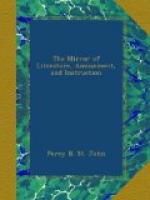* * * * *
A DESULTORY CHAPTER ON LOCALITIES.
(For the Mirror.)
Rotterdam and Erasmus.—Holyrood
and Mary Queen of
Scots.—Scotland.—Switzerland
and Rousseau.—Pope’s
Grotto.—Chiswick,
&c.
There is perhaps no sentiment more generally felt, or more delightful, than that indescribable interest with which we are led to contemplate places and scenes, immortalized in historical renown, or hallowed by genius.
The propensity for moving from place to place, so observable in mankind, derives, no doubt, its chief zest from the anxiety we feel to visit countries of which in the course of our historical researches, we have heard and read so much to awaken our interest, and excite our admiration.
Without the early reverence which we as boys imbibe for the departed splendour of Greece and Rome, we should not as men be found wandering among the ruins of the Pyraeus, or the deserted streets of Pompeii. We find it impossible to behold unmoved the sad, the astonishing changes which time, the arch-destroyer has effected with his giant arm. Our exuberant fancies carry us back to those remote periods when all was glory and magnificence, where now ruin and desolation have established their melancholy empire. Abandoning ourselves to the potent influence of classical contemplations of the past, we revel in the full indulgence of antiquarian enthusiasm. Imagination, however, needs not in general so wide a field for the exercise of her magic powers. We desire perhaps more of pleasurable excitement from the recollections attached to spots identified in our minds with events of individual or ideal interest, than from the loftier train of thoughts produced by a pilgrimage to countries which have become famous in ancient or modern story. Thus we experience more delight in visiting places, remarkable as having once been the resort or habitations of distinguished men, than in viewing the ruins of an ancient citadel, or the site of a celebrated battle. The events achieved on the latter may indeed, in their time, have turned the scale of empires; but the association of ideas in the former instances, speak a thousand times more feeling to our individual sympathies. I remember when passing a couple of days in the opulent city of Rotterdam, that after walking all the morning along its crowded streets, and paying the accustomed stranger’s tribute of admiration to its quays, its port, and its commercial magnificence, I at length halted before the statue of Erasmus. It stands on a pedestal in the middle of a large market, and represents the celebrated scholar, clothed in his professor’s gown, and seemingly gazing with dignified unconcern at the busy multitude around. I remained looking at the effigy before me, with a reverential feeling akin to that of the devotee at the shrine of a patron saint. Imagination transported me back to the




